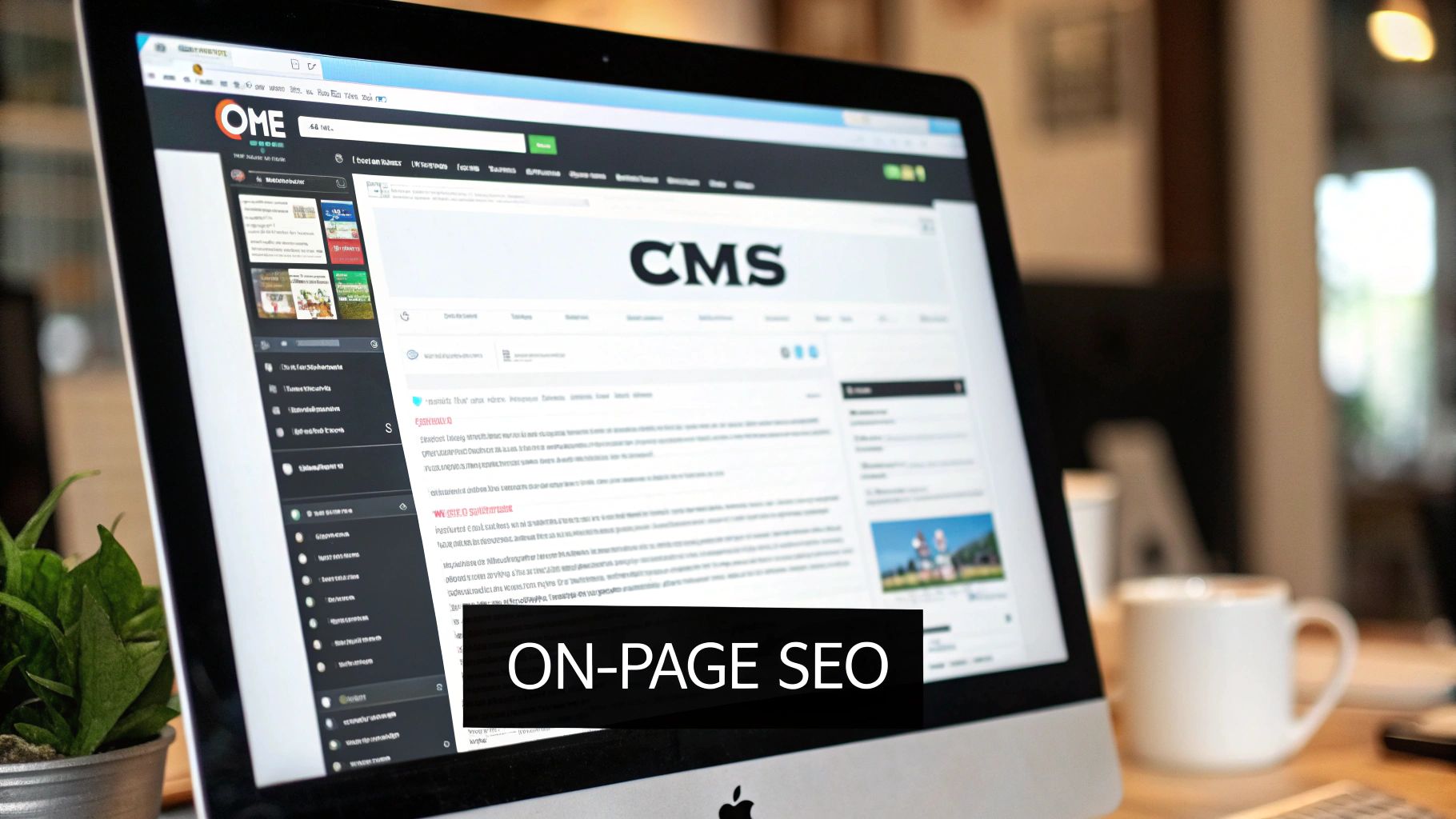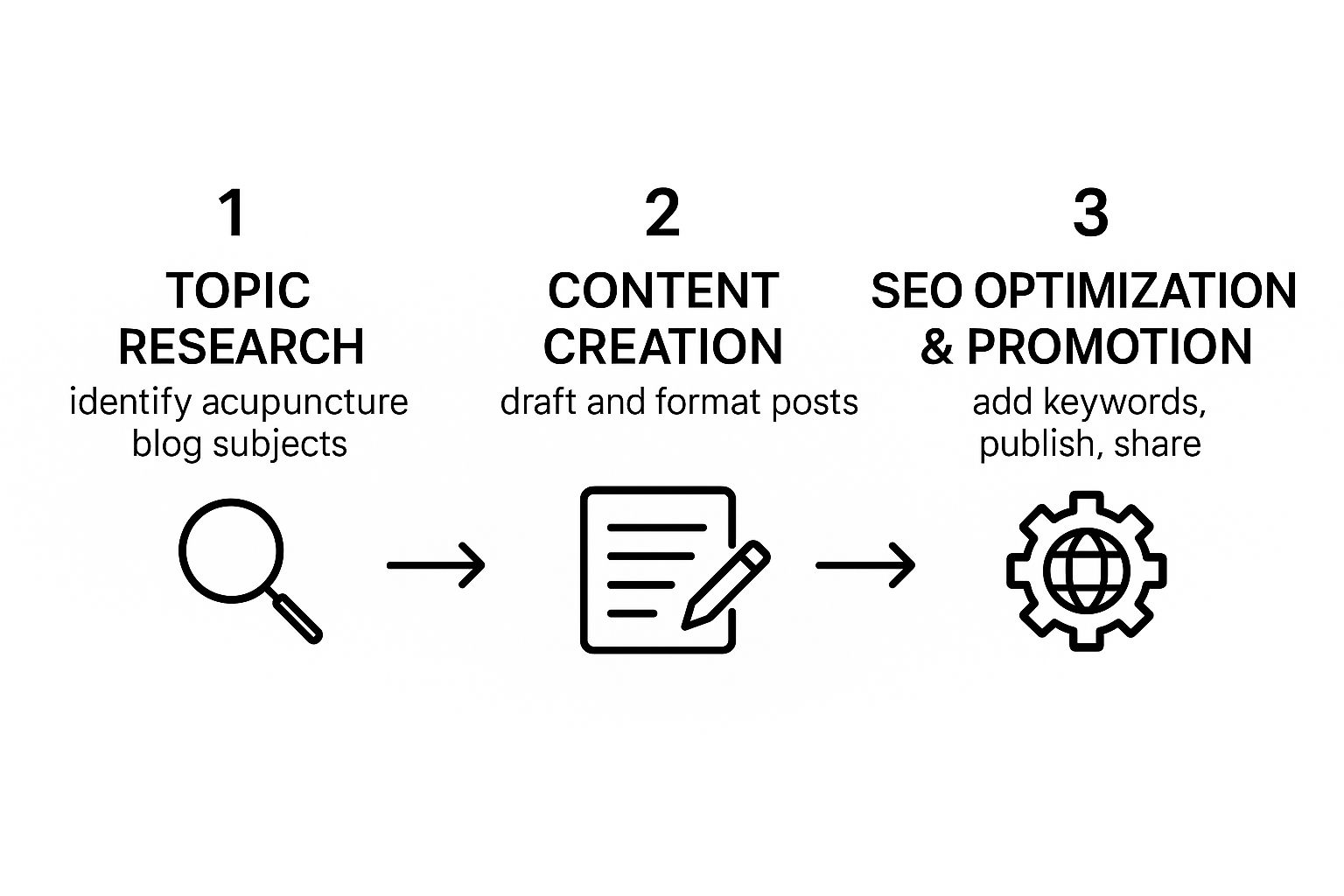Acupuncture SEO is how your clinic's website appears when people in your area search on Google. When someone nearby types "acupuncture for back pain," you want your clinic to show up first.
Getting this right means more website clicks, more phone calls, and more patients walking through your door.
Why Your Practice Needs Acupuncture SEO
You got into acupuncture to help people, not to become a digital marketing expert. But what if the best way to help more people is to make it easy for them to find you online?
That's all acupuncture SEO really is. It builds a digital bridge from someone’s health problem directly to your treatment room.
Imagine a potential patient searching for "acupuncture for migraines near me." Showing up on the first page of Google means you are seen as the local expert right when they need help. It's about connecting with real people looking for the relief you offer.
The Growing Demand for Acupuncture
More people are turning to acupuncture, which is great, but it also means more competition. The US acupuncturist market was valued at $796.9 million in 2024 and is expected to climb to nearly $826 million in 2025.
This steady growth means just having a website isn't enough anymore. You need a plan to bring new patients in the door consistently.
In Short: Good SEO connects a patient's problem with your solution. It turns online searches into actual appointments, keeping your schedule full.
What Does Good SEO Actually Do?
What are the real-world benefits of investing time in search engine optimization? It’s about more than just grabbing the top spot on Google.
- Builds Trust and Credibility: A high Google ranking is like a strong recommendation. People trust the clinics at the top of the search results.
- Attracts Patients Ready to Book: People searching for specific acupuncture services have a real problem and are looking for a solution. SEO brings these motivated people to you.
- Creates a Better Patient Experience: Modern SEO is about making your website fast, easy to use on a phone, and full of helpful information. This boosts your rankings and makes potential patients feel confident enough to book.
If you want to dive deeper, this practical masterclass on improving search engine rankings is a great resource.
Finding the Keywords Your Patients Use
Your SEO strategy must start with the words your future patients are typing into Google. It's easy to focus on broad terms like "acupuncture," but patients are usually more specific.

Think about it. Someone searching "acupuncture" is just researching. Someone searching "fertility acupuncture in Brooklyn" is ready to book an appointment.
Our goal is to find these high-intent, specific phrases. You don’t need expensive tools. It’s about listening to your patients' questions and using simple methods to find more online.
Think Like a Patient
First, get out of the practitioner mindset. You know the clinical terms, but your patients use everyday language. They aren't searching for "auricular acupuncture for smoking cessation." They're searching for "acupuncture to quit smoking."
Start by brainstorming the conditions you treat most often.
- Chronic back pain
- Migraines and headaches
- Anxiety and stress
- Infertility support
- Seasonal allergies
This list is your foundation. Now, we'll turn these conditions into long-tail keywords. These are longer, more specific phrases that attract people closer to booking.
Using Google to Find Keywords
Google itself is your best tool for keyword research.
1. Google Autocomplete: Start typing a service like "acupuncture for back pain" and see what Google suggests. These are real searches people are making. You might see "acupuncture for lower back pain" or "how many acupuncture sessions for back pain."
2. People Also Ask (PAA): This section on the search results page is a goldmine. It shows direct questions your potential patients are asking. Clicking on one reveals even more related questions.
For a search like "acupuncture for anxiety," the PAA box might show:
- How quickly does acupuncture work for anxiety?
- Where are the acupuncture points for anxiety?
- Is acupuncture good for panic attacks?
Each question is an opportunity for a blog post, an FAQ page, or a new section on a service page. Answering these questions directly makes your website more helpful, which Google rewards.
Combining Services with Locations
The final step is localizing your keywords. Adding your city or neighborhood is what makes your acupuncture SEO work. It tells Google who your content is for.
Just take your list of services and add your location.
Below is a table showing how to structure these keywords.
Local Keyword Ideas for Your Acupuncture Practice
| Patient Need or Condition | Keyword Modifier | Your City/Neighborhood | Example Long-Tail Keyword |
|---|---|---|---|
| Migraines | "relief" or "treatment" | Austin, TX | migraine relief acupuncture Austin TX |
| Back Pain | "for pain" or "near me" | Downtown Seattle | cupping therapy for pain near downtown Seattle |
| Anti-Aging | "cosmetic" or "facial" | Phoenix | cosmetic acupuncture Phoenix |
| Fertility | "for infertility" | Brooklyn | acupuncture for infertility in Brooklyn |
| Stress | "for anxiety" | Boulder, CO | best acupuncturist for anxiety in Boulder CO |
By combining a patient's problem with their location, you build a keyword list that attracts the right people in your community.
Turning Your Website Into a Patient Magnet
Your website is your virtual front desk. It's the first interaction a potential patient has with your clinic. To connect with local patients, your website needs to be clear, helpful, and easy to use.

This starts with how you organize your site. A common mistake is putting everything under one "Services" page. A better approach for acupuncture SEO is to give each main treatment its own page.
Give Each Core Service Its Own Page
Each top reason a new patient comes to you needs its own dedicated page. This signals to Google that you're an authority on these specific topics.
For example, your site structure could look like this:
- Acupuncture for Pain Management: Targets terms like "acupuncture for back pain in [Your City]."
- Fertility Acupuncture: Focuses on searches like "natural fertility support [Your City]."
- Cosmetic or Facial Acupuncture: Targets searches such as "facial rejuvenation acupuncture near me."
- Acupuncture for Anxiety and Stress: Addresses keywords tied to mental and emotional well-being.
Creating these individual pages helps you show up in more search results. For more on this, our guide on marketing for doctors is a great resource.
Answer Patient Questions in Advance
Once you have your service pages, make them incredibly useful. Anticipate every question a new patient might have and answer it on the page.
In Short: A great website educates, not just sells. Answering questions builds trust and positions you as an expert.
Add these key sections to each service page:
- What to Expect: Describe a first-time visit for that specific treatment.
- Common Questions (FAQs): Include 3-5 real questions you get often, like "How many sessions will I need for migraine relief?" or "Does cosmetic acupuncture hurt?"
- The Benefits: Clearly explain the potential outcomes and how your treatment helps.
This strategy makes your website a valuable resource for both Google and patients. It also positions you to capture new patients as the demand for acupuncture grows. The global market is expected to jump from USD 48.10 billion in 2025 to USD 78.21 billion by 2032.
Optimizing Your Google Business Profile
When you search for a local service like "acupuncture near me," the first thing you see is the Google Map Pack. This box with a map and a few business listings is the most important digital real estate for a local practice.
Your Google Business Profile (GBP) is what gets you in that box. A strong profile can make your phone ring before someone even visits your website.
Nailing the Basics for Maximum Visibility
First, claim and completely fill out your profile. Leaving fields blank looks unprofessional and is a missed opportunity.
Go through every section and ensure the information is accurate.
- Your Exact Clinic Name: Use your real business name. Don't add keywords like "Downtown Acupuncture for Back Pain."
- Address and Phone Number: This must be 100% consistent with what’s on your website and other online listings.
- Hours of Operation: Keep them updated, especially for holidays.
- Website Link: Double-check that it works and goes to your homepage.
This flow chart shows how everything connects, from patient searches to your GBP listing.

It all starts with knowing what your patients need.
Choosing the Right Categories and Services
This is a crucial step. Your primary category should be "Acupuncturist" or "Acupuncture Clinic." Choose the one that fits best.
Then, add secondary categories. If you offer massage, add "Massage Therapist." If you focus on holistic health, "Wellness Center" is a good option. If you treat chronic conditions, add "Pain Control Clinic."
List your specific services too, like "Cupping Therapy," "Gua Sha," or "Herbal Medicine." The more details you provide, the better you’ll rank for those specific searches.
Turning Reviews Into a Superpower
Reviews are the lifeblood of any local business. Over 90% of people check online reviews before trying a new business. Good reviews build trust with both patients and Google.
Consistently getting new, positive reviews is one of the most powerful ways to rank higher in the local map pack.
In Short: Don't be shy about asking happy patients for a review. Make it very easy for them with a direct link.
Also, respond to every review, good or bad. Thanking someone for a positive comment or professionally addressing a concern shows you care about your patients' experience.
How Do You Get More Reviews?
Getting a steady flow of reviews is simple with a system.
- Ask at the Right Time: The best moment is right after a great experience, as they're checking out.
- Send a Follow-Up Email: A day after their appointment, send an automated email with a direct link to your review page.
- Use a QR Code: Have a small card at your front desk with a QR code that goes straight to your review page.
Building Trust with Local Links and Citations
Think of your clinic's online presence like its real-world reputation. When other respected businesses mention you online, it’s a powerful endorsement. In acupuncture SEO, these are called backlinks and local citations.
These are "votes of confidence" that tell Google you're a legitimate local business. The more consistent mentions of your clinic’s name, address, and phone number (NAP) Google finds, the more it trusts you.

This sounds technical, but it’s straightforward. We'll focus on getting your local citations right and earning some simple, high-quality backlinks.
What Is a Local Citation?
A local citation is any online mention of your clinic's Name, Address, and Phone number (NAP). These are critical for local search rankings.
The golden rule is consistency. Your NAP must be identical everywhere—on your website, Yelp, Healthgrades, and every other directory. Even a small difference, like "St." vs. "Street," can confuse search engines.
In Short: A consistent NAP across the web proves your business information is accurate, which gives Google the confidence to show your clinic in local results.
Start by checking your information on these key platforms:
- Major Directories: Yelp, Yellow Pages, and health sites like Healthgrades.
- Mapping Services: Google Maps, Apple Maps, and Bing Places for Business.
- Social Media: Facebook, Instagram, and LinkedIn business pages.
To get a noticeable boost, a great next step is to master local search citations with some proven strategies.
How to Earn Backlinks That Matter
A backlink is a link from another website to yours. Not all links are equal. A link from a local health blogger is much more valuable than one from a random site. The goal is quality over quantity.
Here are a few practical ideas:
- Sponsor a Local Event: Sponsoring a local 5k, health fair, or school event often gets you a link from their website. This is a powerful local signal.
- Write for a Local Blog: Reach out to local wellness bloggers, chiropractors, or yoga studios and offer to write a guest article. A piece on "How Acupuncture Complements Yoga" could earn you a valuable link.
- Join Local Business Groups: Your local chamber of commerce or business associations usually have member directories with links to your website.
These strategies build real-world relationships while boosting your online authority. If you're deciding where to spend your marketing budget, our guide comparing PPC vs. SEO for doctors' offices can offer more perspective.
Frequently Asked Questions About Acupuncture SEO
Diving into SEO for your acupuncture practice can feel overwhelming at first. But it’s really just about making smart, consistent moves to help the right patients find you.
Here are answers to some of the most common questions from acupuncturists.
How long does it take for SEO to work for acupuncture?
The honest answer is: it depends. SEO is a marathon, not a sprint. You might see some quick wins with your Google Business Profile in the first 1-3 months. But for significant, lasting traffic that fills your schedule, you’re typically looking at 4-6 months of consistent work. The key is patience, as the results compound over time.
How can I promote my acupuncture business?
Promoting your acupuncture business involves a mix of online and offline strategies. Here are the most effective ones:
- Local SEO: Optimize your Google Business Profile and website for local search terms like "acupuncture for back pain [your city]."
- Content Marketing: Create blog posts or videos that answer common patient questions.
- Patient Reviews: Encourage happy patients to leave reviews on Google, Yelp, and other platforms.
- Local Networking: Connect with other local wellness providers like chiropractors, massage therapists, and yoga studios for cross-referrals.
How do I get more acupuncture patients?
To get more patients, focus on being visible where they are looking for help.
- Optimize for Local Search: Make sure your clinic shows up prominently on Google Maps and local search results.
- Build a Helpful Website: Create dedicated pages for each condition you treat (e.g., migraines, fertility) and answer patient questions thoroughly.
- Encourage Referrals: Ask satisfied patients to refer their friends and family.
- Leverage Online Reviews: A strong base of positive reviews builds trust and attracts new patients.
If you're looking for more ways to get the word out, our guide on doctor advertising ideas has some great tips that go beyond just SEO.
At Clicks Geek, we help local practices turn clicks into actual patients. If you're ready to fill up your schedule and get back to focusing on healing, let's talk. https://clicksgeek.com
Is Your Business Ranking in Google Maps?
Turn Google Maps into a Lead Engine w/ Clicks Geek’s AI-powered local SEO. 3,000+ clients served. Our proprietary, fully done-for-you Maps SEO system handles everything—keyword targeting, local optimization, content, reviews, and ranking strategy—automatically.




